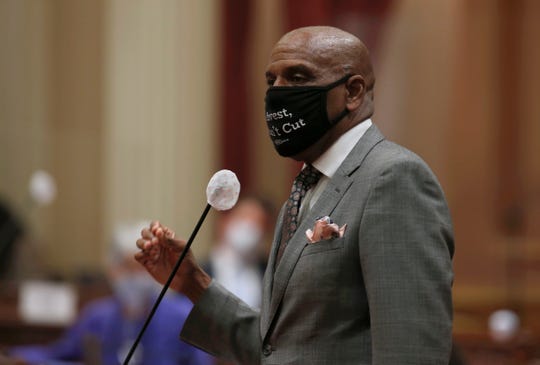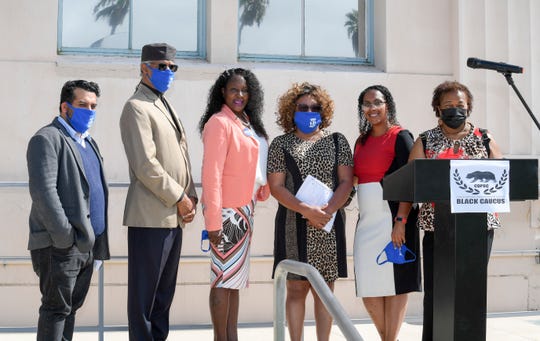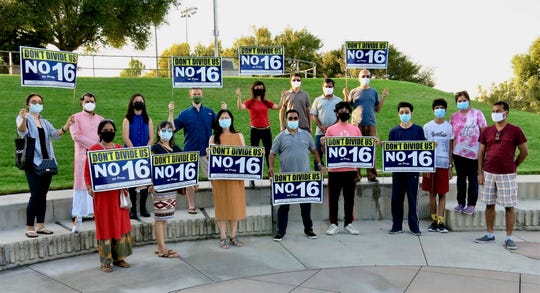On Nov. 3, California will decide whether to allow affirmative action in public hiring, contracting and college admissions, nearly a quarter century after voters outlawed programs that give preferences based on race and gender. (Oct. 1)
AP Domestic
SAN FRANCISCO — On Election Day, Californians can reverse a 24-year-old law that bans affirmative action, a move many here feel would honor the roiling national discussion on racial equality while addressing the effects of systemic racism in a state largely made up of people of color.
Prop 16, one of a dozen propositions before voters this election season, would seem like an easy sell in California, a solidly Democratic state whose politicians and policies have consistently been a thorn in the side of President Donald Trump. Latinos, who represent 39% of the population, are a growing political force, and Black Lives Matter protests have been prevalent in the state’s major cities. White, non-Hispanic Californians make up only 37% of the population.
But polls suggest that reversing California’s affirmative action ban remains a tough sell.
Political experts say factors include voters preferring the status quo, concerns that schools would begin favoring wealthy students of color, and even a perception among Asian Americans — who are 7% of the state population but this year represented 33% of first-year student in the nine-university public system — that voting in Prop 16 could ultimately cut into their own gains in universities and the job market.

California State Sen. Steve Bradford, D-Gardena, urges lawmakers to approve a measure to place a proposed Constitutional amendment on the November ballot to overturn the ban on state affirmative action programs, at the Capitol in Sacramento last June. Voters in the state with decide on Nov. 3 whether Prop 16 overturns 1996’s Prop 209. (Photo: Rich Pedroncelli, AP)
“Asian communities have contributed greatly to the advancement of America,” says retired attorney Betty Chu, honorary co-chair of the No on 16 campaign. “If people vote yes here, it could extinguish our community in California and America.”
Karthick Ramakrishnan, a professor of public policy at the University of California, Riverside, who focuses on Asian American and Pacific Islander trends, says the biggest issue facing Prop 16 is “a gap between those who say they support affirmative action and those declaring that they’ll support the proposition.”
According to a recent 2020 Asian American Voter and Public Policy Institute of California survey, 47% of Californians oppose Prop 16, while 31% support it and 22% don’t know. White voters oppose the measure by a two to one margin, Latinos are deadlocked at 41%, and a majority of Asians, 43%, say they don’t know which way they’ll vote.
The ban on affirmative action, which California shares with eight other states including Florida, Oklahoma and Idaho, states there should be no consideration for race, sex or ethnicity in public employment, contracting or education.
The discord around Prop 16 is “reflective of California’s schizophrenic relationship to issues of race,” says James Taylor, professor of politics at the University of San Francisco. “Underneath a veneer of liberalism is a view of Black communities as being a nagging unwelcome presence.”
Taylor points out that California may have liberal pockets, but it is also a place where police brutality took root, notably in the Los Angeles police department of chief Darryl Gates of the early 1990s, and Republican leadership has thrived, as exemplified by conservative governor turned president Ronald Reagan. In the early part of the 20th century, the burgeoning city of Los Angeles was home to white supremacy and redlining.

Supporters of four pro-Black ballot initiatives on the November California ballot gather at a press conference hosted by the California Democratic Party Black Caucus and Black leaders in San Diego. Among the proposition they support is 16, which would repeal an amendment to the state constitution that bans affirmative action. (Photo: Denis Poroy, AP)
The result is opportunities for Black Californians, in particular, remain limited, with Black high school students lagging other ethnicities in being prepared for college. The median income for Black Californians lags behind that of white residents.
The debate over how to best provide opportunities for people of color has remained a fractious one, says Melvin Urofsky, author of “The Affirmative Action Puzzle: A Living History from Reconstruction to Today.”
“Few these days say they’re not in favor of diversity, but the problem is how do you get it,” says Urofsky. “Often, it seems like a no-win proposition to many. If a person of color gets a seat, maybe it means your kid didn’t get a shot.”
The issue of fair access to education has involved the highest court in the land. In a landmark 1978 case, California Regents vs. Bakke, the U.S. Supreme Court ruled that racial quotas were unconstitutional but affirmative action was valid in some circumstances.
That ruling has been cited in an ongoing lawsuit against Harvard University by Asian American students who felt they were being excluded from admissions because the school was limiting members of that ethnic group from enrolling.
‘One of the most dangerous propositions on the ballot’
Passions run high on both sides of the Prop 16 debate. Opponents say that affirmative action inherently creates a stigma for those who benefit from it and creates a disincentive to succeed on one’s own merits.
“You shouldn’t use racism to lessen racism,” says Chu. “This is the most dangerous proposition on the ballot. Diversity is something we all need, but it shouldn’t be achieved by pitting one race against another.”

California’s Proposition 16, which will be voted on this Election Day, would repeal a 24-year-old amendment to the state constitution that bans affirmative action. Those opposed to Prop 16, shown gathered in this photo, contend that the proposition could unfairly penalize groups, such as Asian Americans, who deserve university admissions and public jobs based solely on merit. (Photo: Courtesy of No on 16)
Supporters of Prop 16 counter that decades of systemic racism requires state institutions to level the playing field and that without such allowances people of color will continue to lag the general population in education and employment. California is known for its tech industry, but no Black executives lead its top companies. At the other end of the socioeconomic spectrum, 28% of Black Californians live in poverty compared to 22% nationally, according to the Census Bureau.
“We have lost an entire generation of Latino doctors and African American lawyers because of the ban on affirmation action,” says Michele Siqueiros, a Yes on 16 committee member and president of The Campaign for College Opportunity. “We are on the right side of history. This is a different California than the one that passed Prop 209.”
If passed, Prop 16 would repeal Prop 209, which narrowly won a majority of votes in 1996 at a time when California leaned right. The governor was Republican Pete Wilson, who also was at the helm of the state’s controversial anti-immigrant Proposition 187 in 1994, which in part denied undocumented immigrants non-emergency health care.
In the decades since the passage of 209, many Californians of color have suffered, according to an August study by the University of California, Berkeley, economics Ph.D candidate Zachary Bleemer.
In his report, Bleemer notes that ending affirmative action not only “deterred thousands of qualified underrepresented minorities from applying to any UC campus,” but also caused a 3% decline in the number of early-career underrepresented people of color earning more than $100,000.
Yes on 16 advocates also add that businesses owned by women and people of color lose out on $1.1 billion in government contracts each year.
Prop 209 has withstood a number of legal challenges over the decades, leading some politicians to push for a more equitable playing field in other ways. In September, California Gov. Gavin Newsom signed a new law requiring publicly traded companies headquartered in California to appoint directors from underrepresented communities to their boards, the first such law in the country.
Advocates say such measures are welcome, but passing Prop 16 would have a ripple effect among a generation that represents the state’s inevitably diverse future.
“If Californians want to take action around systemic racism and gender discrimination, this is the way to do it,” says Yes on 16 consultant Nicole Derse.
She points out that Prop16 has the support of U.S. Sen. Kamala Harris of California,the nation’s first woman of color vice-presidential nominee. The Yes on 16 campaign has raised nearly $13 million, while the No on 16 group has raised just under $1 million, according to Ballotpedia.
Prop 16’s language does not use the term affirmative action. Instead, the proposition “permits government decision-making policies to consider race, sex, color, ethnicity, or national origin in order to address diversity by repealing constitutional provision prohibiting such policies.”
“Our biggest opponent is the confusion around the terminology,” says Perse. “But we feel confident when people look into it, they’ll see its merits.”
But critics such as Ward Connerly say the measure “legalizes discrimination.” Connerly has a reason to be fiercely opposed to Prop 16. He not only is the chairperson of the No on 16 group Californians for Equal Opportunity, but also successfully chaired the 1996 campaign for Prop 209.
Connerly, who is Black, doesn’t mince words when it comes to what he sees as the perils of affirmative action.
“If you are perceived to be benefitting from such action, you wear that badge on your forehead,” he says. “Black people throughout history have been told we can run, dance and play sports, but we are not smart enough to succeed elsewhere. That image of not being up to par attaches to you by the existence of affirmative action. If I could overcome being an orphan, being poor, others can, too.”
Taylor of the University of San Francisco bristles at such a declaration. As a Long Island youth, Taylor says he was one step away “from being a cliché, Black, fatherless, involved in crime,” when he was awarded a $500 scholarship to enroll in college.
“What the Ward Connerlys of the world need to understand is that many young people are on the precipice, and sometimes being given a small helping hand makes all the difference,” says Taylor. “What’s on the ballot with Prop 16 is nothing less than the racial mood of California today.”
Follow USA TODAY national correspondent Marco della Cava: @marcodellacava
Read or Share this story: https://www.usatoday.com/story/news/nation/2020/10/26/california-law-bans-affirmative-action-but-could-change-nov-3/3714505001/
Credit: Source link


